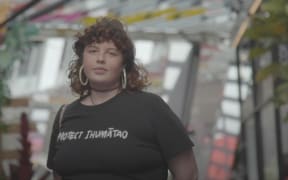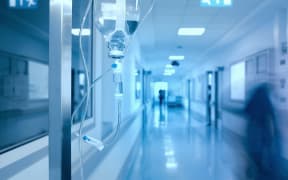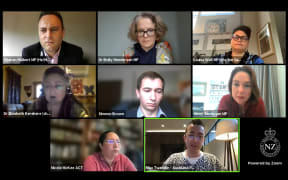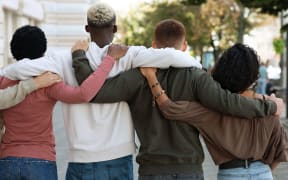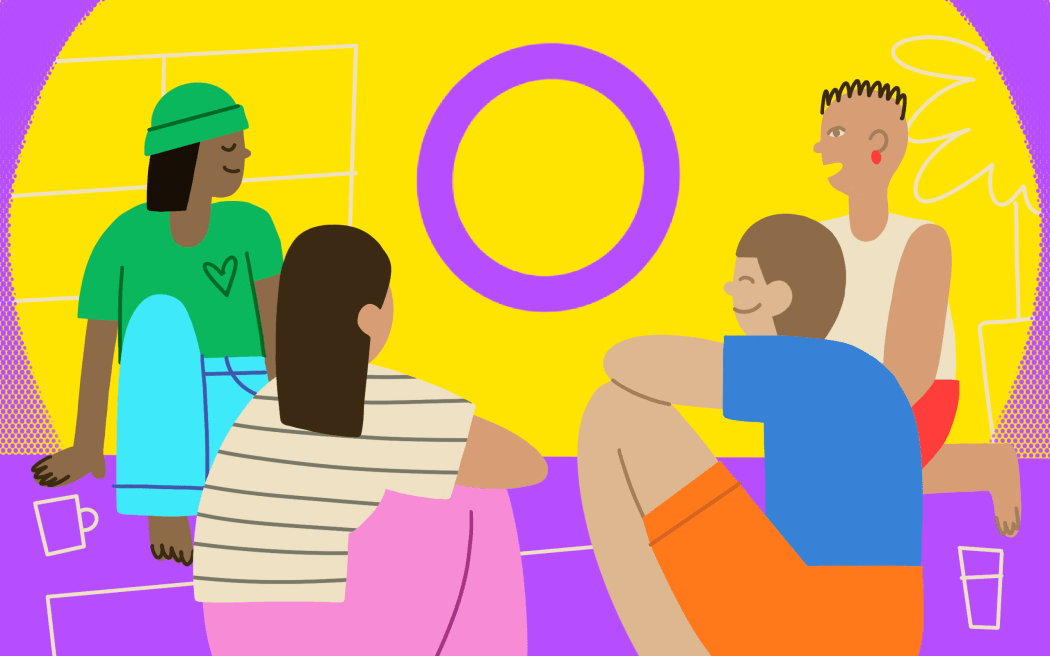
Intersex Aotearoa is the country's only intersex-led and national reaching organisation for people who have variations of sex characteristics. Photo: RNZ
Today is Intersex Awareness Day, marking the anniversary of the first public demonstration by intersex people in the US, which took place in 1996.
Intersex Aotearoa is the country's only intersex-led and national reaching organisation for people who have variations of sex characteristics.
"Information and education about intersex is harm reduction," Intersex Aotearoa communications and community manager Jelly O'Shea said.
"Because the more people know about their bodies, and the beautiful diversity of the human spectrum of natural ways that bodies can be, the safer we all can be around our own sense of self, and looking after ourselves and making sure that we've got bodily autonomy and making sure that when we're engaging with services, that there's informed consent and we understand what's happening."
O'Shea said it was important to model the language someone uses themselves.
"Language is such a powerful tool and it can also put up barriers for people."
Intersex describes a range of natural variations in the human body, specifically the innate variations in someone's sex characteristics, of which there are over 40 under the umbrella term.
While the organisation has the word intersex - which is a reclaimed medical term - in its name, some people may use the term "variations of sex characteristics" or have another preferred term.
Particular medical terms for each variation type are used by healthcare professionals.
Sex characteristics can include hormones, chromosomes, internal and external anatomy.
People who reached out to Intersex Aotearoa often said they had been told they would never meet anyone like them, O'Shea said.
"It is really sad knowing that some people don't access our services because they feel like intersex has to mean a particular thing. It doesn't.
"It's got nothing to do with your sexuality or your gender identity. We know the majority of people with sex variations are actually cisgender, and often heterosexual."
Intersex people often had to dispel myths about their bodies, O'Shea said.
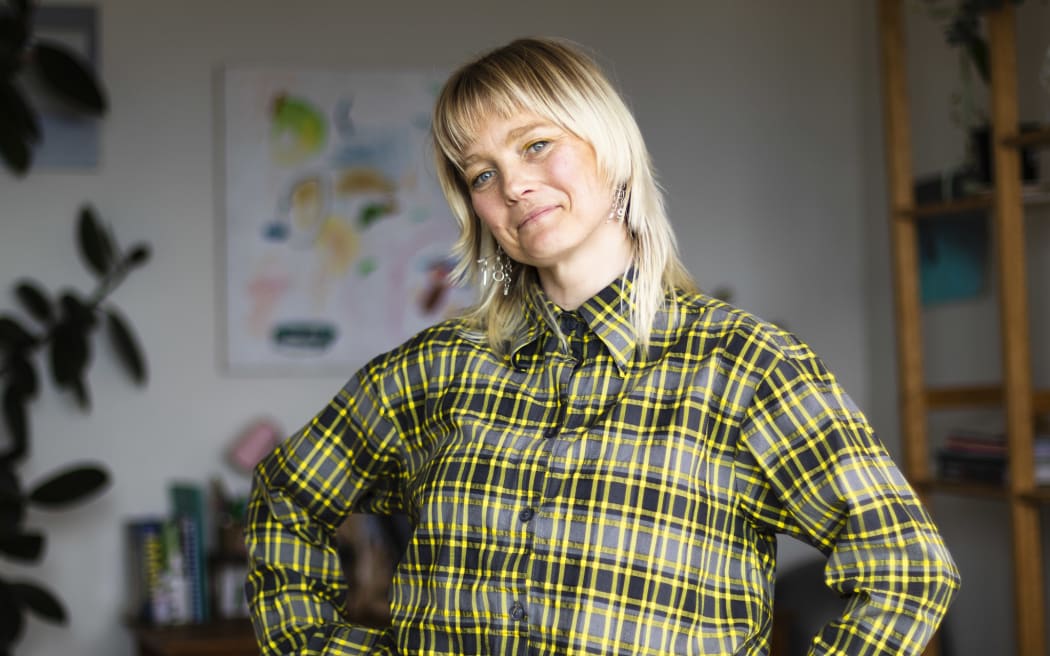
Jelly O'Shea. Photo: Supplied / Ted Whitaker
"I acknowledge that the way that people think about these things is something they've inherited from the systems that we present to them daily."
For example, the way information and data was kept, sex and gender was often conflated and used interchangeably, she said.
This led people to believe intersex was the same as being trans, which "invisibilises" intersex people, they said.
When this happens, including within healthcare settings, "all our needs, specificities and sort of intersections that are really specific to intersex people are kind of erased".
"If we can just nail some of those key differences around sex and gender … we all can have a sexuality, we all can have a gender expression and we all have sex characteristics."
O'Shea acknowledged this was Western framing.
"I really want to acknowledge indigenous peoples don't categorise themselves in these ways and so there's a whole other conversation that needs to happen around kaupapa Māori ways of being."
The kupu Māori used by Intersex Aotearoa co-chairperson Tu Chapman is Ira Tangata - a reference to identity and whakapapa.
Everyone had primary and secondary sex characteristics and all of these could manifest differently for people, O'Shea said.
"Sometimes that can be visible at birth, sometimes that can become more apparent through puberty and sometimes that might be later when people are processing fertility and get diagnosed then. And for some people, they'll never know that they have an intersex variation - for many reasons."
Ahead of Intersex Awareness Day, Intersex Aotearoa and Just the Facts released a four-part video series for and by intersex rangatahi called Insights. It explores puberty, relationships, sexual health, consent and more.
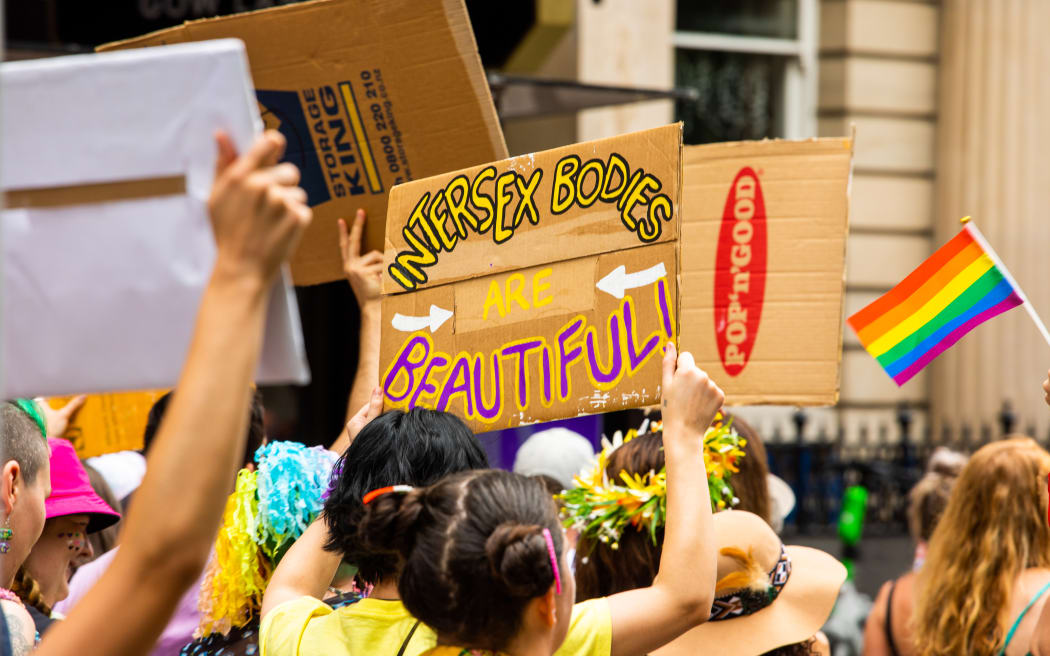
The Auckland Pride March 2023 elevated intersex voices. Photo: Supplied / Sam Sutherland
There is currently no data on intersex populations in Aotearoa though intersex was included in the Census for the first time this year.
O'Shea thought this would not be representative of the community for some years yet.
"We're imagining intersex will score quite low as ... those language barriers and lack of general awareness it will probably take some more years of socialisation before we really start seeing the numbers come through, which should be more around 1.7 to 2.3 percent."
Intersex Aotearoa was always calling for more research - supported by intersex experts - that captured the true realities of what was going on, she said.
Breaking down barriers between healthcare professionals and intersex advocates
"Across the healthcare sector there is a dire lack of understanding about intersex variations, and how these can impact the health and wellbeing of people with variations of sex characteristics," O'Shea said.
"We need support across healthcare, we need to feel like we can go and ask questions about our body and why it does this thing, what might support our healthcare for us to live healthier and better lives, and those answers aren't there currently.
"I would challenge the healthcare sector in the fact that thereby, they're not doing their job if they're not educating people on the basis of human diversity."
O'Shea said Intersex Aotearoa was hearing from an increasing number of people and many wanted a peer navigator to support them through their medical journey.
The non-profit provided them with peer support and information while moving along their journey with them as much as possible, she said.
Despite running for 25 years it has only in the past year begun to receive direct referrals from clinicians when someone with an intersex variation is wanting to connect with other people with similar experiences.
"It really is an example of the disconnect and how important it is for us to break down some of those walls that are up between service providers across healthcare and intersex advocates."
The government has recently put out a tender for an intersex peer support service, with money earmarked in the 2022 Budget.
That saw $2.5 million over four years put aside to support healthcare for intersex people, with the work currently in the procurement process. It will focus on four key areas including best practice guidelines for healthcare workers from a human rights approach, training for healthcare providers, delivery of peer support services and resources.
In 2022 the Associate Minister of Health was Ayesha Verrall. She said when announcing the funding that many health professionals had expressed a lack of knowledge about how to properly care for intersex people.
"This will empower intersex children and young people and their whānau to make informed decisions about medical interventions and will better protect the rights of intersex children and young people within the health system and prevent unnecessary medical interventions from occurring," Verrall said.
She said the health system needed an attitudinal shift from a medicalised health model towards one that focused on "providing the support and services that intersex people need to live in the way they choose".
Alongside other intersex experts and academics, O'Shea said Intersex Aotearoa has developed an ongoing relationship with the Ministry of Health and Te Whatu Ora at an advisory level to inform and recommend key underpinning values "with a Mātauranga Māori perspective and with a human rights based framework".
They said Intersex Aotearoa hopes the work will be intersex-led and there be recognition that those who have worked in this field have expertise.
Relationships need to be built with the incoming government to ensure they understand what the work was about, she said.
"We hope that the new government will also respect the work continuing."
Intersex protections under the law
Intersex Aotearoa says medically-unnecessary surgeries on infants, young people and adults are still common in Aotearoa's hospitals. The UN deems these "non-urgent and non-essential" surgeries.
The Australian state of ACT brought in legislative prohibitions around intersex surgeries earlier this year.
"It's something the United Nations has been calling on for many years and asking governments to respond to and many have around the world to different varying degrees of success," O'Shea said.
"And it was decided here that, instead of going down the legislation route, that there'd be this development of the best practice guidelines.
"I think the idea behind that was that it was about changing attitudes, and bringing everyone along on the same waka, rather than the sort of more punitive approach. So whatever you think about that - there's varying opinions about whether that's the right or wrong way - but that's kind of where we are."
Intersex Aotearoa wants Te Whatu Ora to implement internal mechanisms to record and document surgical interventions happening on young people.
"At the moment we do not have any sort of national database and we have healthcare professionals using all sorts of different coding."
Te Whatu Ora said it was currently working with districts throughout the motu "looking at what we acknowledge is an inconsistent and inequitable delivery of care in some regions including reviewing to see if any is occurring for people with variations of sex characteristics (intersex people)".
"This will take some time to address as we work towards equitable, consistent, and sustainable service delivery."
Surgical interventions on intersex infants were ruled out of scope of the Conversion Practices Prohibition legislation passed in 2022.
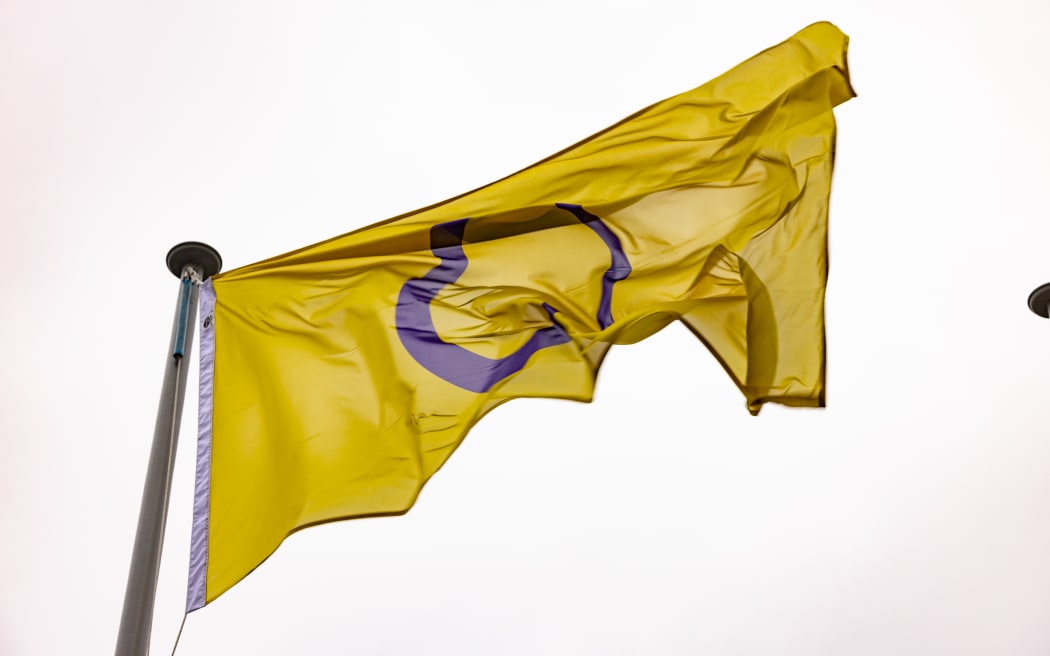
The first time a national Parliament flew the intersex flag was in New Zealand in 2018. Photo: Phil Smith
Hate speech laws proposed by the Labour government in 2021 included a proposal which would update the language of Section 21 to consider and include discrimination against intersex people, as well as trans, gender diverse people.
The government in 2022 referred this to the Law Commission, along with other aspects of the proposed law.
In August, Former MP Elizabeth Kerekere's member's Bill was drawn proposing an amendment to the Human Rights Act, prohibiting discrimination based on variations of sex characteristics as well as on gender identity or expression.
"We really really hope that everyone can support the importance of this and everyone should have clear access to human rights," O'Shea said.
In February 2023, the United Nations Committee of the Rights of the Child gave recommendations to the New Zealand government that intersex health protocol and guidelines being developed set out guarantees for the mental and bodily integrity, autonomy and self-determination of intersex children including by:
- "Prohibiting non-urgent and non-essential (including feminising or masculinising) medical or surgical treatment of intersex children before they are of sufficient age or maturity to make their own decisions and provide free, prior and informed consent;
- "Ensuring independent oversight of decision-making to ensure that medical treatments for children with intersex traits who are unable to consent are necessary, urgent and the least invasive option;
- "Providing redress to victims of non-urgent and non-essential treatment, including appropriate compensation;
- "Ensure that all intersex children, adolescents and their families have access to community-based psychosocial and peer support."

